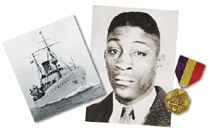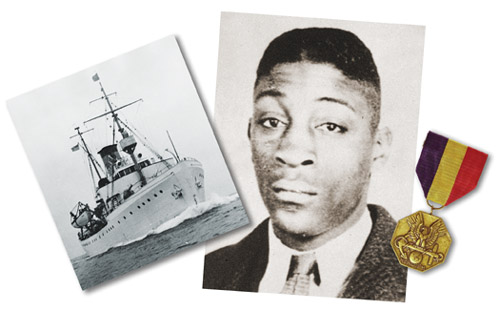Charles W. David, Jr., was not allowed to eat in the same restaurants or drink in the same bars as his fellow American servicemen. He could, however, save their lives as their ship sank into the frigid North Atlantic. And he did.


At sea off Greenland in the wee hours of February 3, 1943, coast guardsman Charles W. David, Jr., left the safety of the cutter Commanche (left) to save others. His heroism won him the Navy and Marine Corps Medal (right), but cost him his life. (Ship from the National Archives and portrait and medal from the US Coast Guard) David enlisted in the coast guard early in the war and left his New York City home with the ominous parting line, “I have to die some day, and I can’t think of a better way.” A black man, he was made a mess attendant, one of the few positions open to African Americans at the time. But despite official segregation, Stewardsmate 1st Class David had a lot of white friends. He regularly played the blues on harmonica with white crewmate Richard Swanson on sax.
On February 3, 1943, he was aboard the cutter Comanche as it escorted the troop transport Dorchester toward Greenland with 1,000 GIs aboard. In the darkness of early morning, a U-boat torpedoed the Dorchester and she began sinking. The alarm sounded aboard the Comanche, and the 26-year-old David stumbled out of his bunk, cutting short the sleep he had hoped would help knock out his nagging cough.
Survivors were floating in life rafts as the Comanche approached. The coast guardsmen threw a cargo net overboard for the freezing survivors to climb up. Many were unable to make it, so David and others jumped over the rail of their ship to help. Swanson went down to the water and could make it only halfway back, so David descended to carry him up. Then he went into the water to pull out his commanding officer and a drowning man the officer was struggling to save.
The exposure was too much for David. Suffering from hypothermia, he weakened as his cough turned into pneumonia, and a few days later he died. He received the Navy and Marine Corps Medal posthumously for his lifesaving effort. In 1999, the Immortal Chaplains Foundation awarded him its first annual Prize for Humanity.



FOLLOW US »
